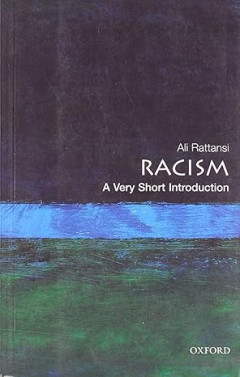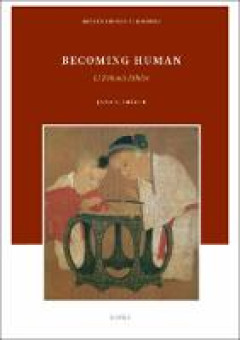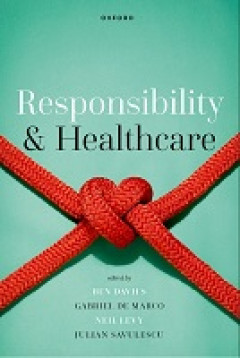Ditapis dengan

E-book Racism: A Very Short Introduction
From subtle discrimination in everyday life, to horrors like lynching in the Old South, cultural imperialism, and "ethnic cleansing", racism exists in many different forms, in almost every facet of society. Despite civil rights movements and other attempts at progress, racial prejudices and stereotypes remain deeply embedded in Western culture. Racism takes a frank and objective look at why the…
- Edisi
- -
- ISBN/ISSN
- 9780192805904
- Deskripsi Fisik
- 209 halaman
- Judul Seri
- -
- No. Panggil
- 170.01 RAT p

E-book Ethics 101: From Altruism and Utilitarianism to Bioethics and Politica…
Ethics 101 offers an exciting look into the history of moral principles that dictate human behavior. Unlike traditional textbooks that overwhelm, this easy-to-read guide presents the key concepts of ethics in fun, straightforward lessons and exercises featuring only the most important facts, theories, and ideas. Ethics 101 includes unique, accessible elements such as: -Explanations of the ma…
- Edisi
- -
- ISBN/ISSN
- 9781507204931
- Deskripsi Fisik
- 256 halaman, ilus.
- Judul Seri
- -
- No. Panggil
- 170.0 BOO e

E-book Becoming Human: Li Zehou's Ethics
The book Becoming Human: Li Zehou’s Ethics offers a critical introduction and in-depth analysis of Li Zehou’s moral philosophy and ethics. Li Zehou, who is one of the most influential contemporary Chinese philosophers, believes that ethics is the most important philosophical discipline. He aims to revive, modernize, develop, and complement Chinese traditional ethics through what he calls �…
- Edisi
- -
- ISBN/ISSN
- 9789004423664
- Deskripsi Fisik
- 347 halaman, ilus.
- Judul Seri
- -
- No. Panggil
- 170.0 ROS b
E-book Reasons and Persons
This book challenges, with several powerful arguments, some of our deepest beliefs about rationality, morality, and personal identity. The author claims that we have a false view of our own nature; that it is often rational to act against our own best interests; that most of us have moral views that are directly self-defeating; and that, when we consider future generations the conclusions will …
- Edisi
- -
- ISBN/ISSN
- 978019824908X
- Deskripsi Fisik
- 560 halaman
- Judul Seri
- -
- No. Panggil
- 170.0 PAR r
E-book Jeremy Bentham and Australia : Convicts, utility and empire
Jeremy Bentham’s writings on Australia, new authoritative editions of which are now published in a volume entitled Panopticon versus New South Wales and other writings on Australia1 in The Collected Works of Jeremy Bentham, have had a profound and enduring influence across a number of fields. For instance, according to the historian John Gascoigne, s…
- Edisi
- -
- ISBN/ISSN
- 9781787358188
- Deskripsi Fisik
- 425 hlm
- Judul Seri
- -
- No. Panggil
- 170 ALL j
E-book Contemporary Debates in Bioethics: European Perspectives
Humans have always had the ability to influence the genetic makeup of their children. Individuals who wanted tall and attractive children, for instance, could find tall and attractive partners to reproduce with, thereby raising the probability that their progeny would be tall and attractive. However, until very recently, this power was limited. Individuals …
- Edisi
- -
- ISBN/ISSN
- 9783110571219
- Deskripsi Fisik
- 187 hlm
- Judul Seri
- -
- No. Panggil
- 170 GYN c
E-book Coping : A Philosophical Guide
You have probably heard Reinhold Niebuhr’s serenity prayer in some version or other: ‘God, grant me the serenity to accept the things I cannot change, the courage to change the things I can, and the wisdom to know the difference.’ It’s clever and touching, but there is a bit of a false dichotomy. There is often very little we can do to make changes to the world, …
- Edisi
- -
- ISBN/ISSN
- 9781800642805
- Deskripsi Fisik
- 175 hlm
- Judul Seri
- -
- No. Panggil
- 170 BOV c
E-book The Things That Really Matter : Philosophical conversations on the cor…
There are many reasons why I liked Mary so much, as a person, a writer and a philosopher. I liked her for her wit, her warmth, her level- headedness and her moral clarity; her ability to steer clear of all unnecessary technicalities and cut straight to the chase, focusing on the big picture rather than getting mired in the details of any particu…
- Edisi
- -
- ISBN/ISSN
- 9781800082175
- Deskripsi Fisik
- 307 hlm
- Judul Seri
- -
- No. Panggil
- 170 HAU t

E-book Kant on Love
What did Immanuel Kant really think about love? This book is the first in-depth study of the concept of love in Kant`s philosophy. It argues that love is much more important to Kant than previously thought, and that understanding love is actually essential for Kantian ethical life. Perhaps surprisingly, for Kant, love permeates human existence from the strongest impulses of nature to the highes…
- Edisi
- -
- ISBN/ISSN
- 9783110544978
- Deskripsi Fisik
- 199 hlm
- Judul Seri
- -
- No. Panggil
- 170 RIN k

E-book Responsibility and Healthcare
Questions of responsibility arise at all levels of health care. Most prominent has been the issue of patient responsibility. Some health conditions that risk death or serious harm are partly the result of lifestyle behaviours such as smoking, lack of exercise, or extreme sports. Are patients with such conditions responsible for them? If so, might healthcare providers, be they state-run systems …
- Edisi
- -
- ISBN/ISSN
- 9780192872234
- Deskripsi Fisik
- 334 halaman
- Judul Seri
- -
- No. Panggil
- 170.0 DAV r
E-book 100 Moral Stories
Once upon a time, there was a king who ruled a prosperous country. One day, he went for a trip to some distant areas of his country. When he was back to his palace, he complained that his feet were very painful, because it was the first time that he went for such a long trip, and the road that he went through was very rough and stony. He then ordered his people to cover every road of the entire…
- Edisi
- -
- ISBN/ISSN
- -
- Deskripsi Fisik
- 76 hlm
- Judul Seri
- -
- No. Panggil
- 170 SYE o

E-Book Living Water: An interdisciplinary exploration of water as a theologic…
Water will undoubtedly become an ever more crucial locus of academic reflection, as Christiana Peppard’s concern that “wars of the future will be fought over water, not oil” (2014) stresses. Increasing water shortages worldwide and global warming of water, in particular the salt water of the oceans, beg further reflection, from natural and agricultural sciences, the legal field, and also …
- Edisi
- -
- ISBN/ISSN
- 9781991269003
- Deskripsi Fisik
- 180 halaman
- Judul Seri
- -
- No. Panggil
- 170 RHE l
 Karya Umum
Karya Umum  Filsafat
Filsafat  Agama
Agama  Ilmu-ilmu Sosial
Ilmu-ilmu Sosial  Bahasa
Bahasa  Ilmu-ilmu Murni
Ilmu-ilmu Murni  Ilmu-ilmu Terapan
Ilmu-ilmu Terapan  Kesenian, Hiburan, dan Olahraga
Kesenian, Hiburan, dan Olahraga  Kesusastraan
Kesusastraan  Geografi dan Sejarah
Geografi dan Sejarah